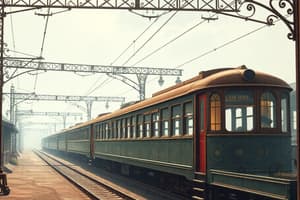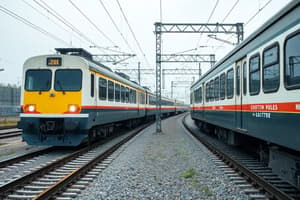Podcast
Questions and Answers
What may appear in Signalling and Telecommunication Circuits when situated close to the OHE?
What may appear in Signalling and Telecommunication Circuits when situated close to the OHE?
- Radio frequencies
- Electromagnetic pulses
- Induced voltage (correct)
- Electrical currents
Why is it important to take precautionary measures when working on Signal and Telecommunication Circuits on 25 KV AC electrified lines?
Why is it important to take precautionary measures when working on Signal and Telecommunication Circuits on 25 KV AC electrified lines?
- To comply with electrified zone regulations
- To reduce electromagnetic interference
- To avoid electrical shocks (correct)
- To prevent fire hazards
What should staff wear when working on Signal and Telecommunication Circuits to minimize the risk of electrical shock?
What should staff wear when working on Signal and Telecommunication Circuits to minimize the risk of electrical shock?
- Insulated boots
- Fire-resistant clothing
- Safety goggles
- Rubber gloves (correct)
What should be done to cable conductors pertaining to the block instruments to minimize the risk of electrical shock?
What should be done to cable conductors pertaining to the block instruments to minimize the risk of electrical shock?
Why should staff insulate themselves from the ground when working on Signal and Telecommunication Circuits?
Why should staff insulate themselves from the ground when working on Signal and Telecommunication Circuits?
What is the purpose of printing 'RED' on the cable terminals?
What is the purpose of printing 'RED' on the cable terminals?
Why is it important to take special precautions when working on equipment or circuits that are earthed?
Why is it important to take special precautions when working on equipment or circuits that are earthed?
What should staff do when the work to be done is of such a nature that rubber gloves cannot be used conveniently?
What should staff do when the work to be done is of such a nature that rubber gloves cannot be used conveniently?
What is the primary reason for keeping sanded catch sidings not alive when an electric engine or multiple unit train is standing in the sanded track?
What is the primary reason for keeping sanded catch sidings not alive when an electric engine or multiple unit train is standing in the sanded track?
Why is it necessary to keep the rails clear of sand for a length of 21.5 meters beyond the section insulators in the overhead lines?
Why is it necessary to keep the rails clear of sand for a length of 21.5 meters beyond the section insulators in the overhead lines?
What is the primary concern related to metallic bodies situated close to O.H.E. in AC traction areas?
What is the primary concern related to metallic bodies situated close to O.H.E. in AC traction areas?
What is the primary purpose of keeping switches controlling the sanded catch sidings in the neutral position?
What is the primary purpose of keeping switches controlling the sanded catch sidings in the neutral position?
What is the primary reason for not allowing people to enter or leave the sanded catch sidings while the overhead equipment is alive?
What is the primary reason for not allowing people to enter or leave the sanded catch sidings while the overhead equipment is alive?
What is the primary concern related to sanded catch sidings in AC traction areas?
What is the primary concern related to sanded catch sidings in AC traction areas?
What is the primary purpose of keeping the rails clear of sand for a length of 21.5 meters beyond the section insulators in the overhead lines?
What is the primary purpose of keeping the rails clear of sand for a length of 21.5 meters beyond the section insulators in the overhead lines?
What is the primary concern related to electrical safety in AC traction areas?
What is the primary concern related to electrical safety in AC traction areas?
What is the primary reason for using underground cables with a metal sheath in electrified areas?
What is the primary reason for using underground cables with a metal sheath in electrified areas?
What is a significant factor that affects the value of induced voltage in conductors parallel to the track?
What is a significant factor that affects the value of induced voltage in conductors parallel to the track?
What is a crucial consideration when erecting signals in electrified areas?
What is a crucial consideration when erecting signals in electrified areas?
What type of signals are required to be used in electrified areas?
What type of signals are required to be used in electrified areas?
What is a consequence of electromagnetic induction in conductors parallel to the track?
What is a consequence of electromagnetic induction in conductors parallel to the track?
What is a key consideration when determining the location of signals in electrified areas?
What is a key consideration when determining the location of signals in electrified areas?
What is the purpose of the metal sheath in underground cables in electrified areas?
What is the purpose of the metal sheath in underground cables in electrified areas?
What is a factor that affects the potential differences between various points along the conductors and the adjacent Earth?
What is a factor that affects the potential differences between various points along the conductors and the adjacent Earth?
What type of tapes should be used in electrified tracks?
What type of tapes should be used in electrified tracks?
What should be kept clear of all materials in electrified structures?
What should be kept clear of all materials in electrified structures?
Why should temporary metallic jumpers be used during maintenance or renewal of track?
Why should temporary metallic jumpers be used during maintenance or renewal of track?
What should be done to the two ends of a fractured rail during maintenance?
What should be done to the two ends of a fractured rail during maintenance?
What should be used when touching the two parts of a rail in case of discontinuity of rails?
What should be used when touching the two parts of a rail in case of discontinuity of rails?
What type of wagons should be used for material trains whenever possible?
What type of wagons should be used for material trains whenever possible?
Who should supervise the loading and unloading of open or hopper wagons in electrified tracks?
Who should supervise the loading and unloading of open or hopper wagons in electrified tracks?
What should be provided by the Electrical Department on requisition during maintenance or renewal of track?
What should be provided by the Electrical Department on requisition during maintenance or renewal of track?
What is the responsibility of every Engineering official working in electrical traction areas?
What is the responsibility of every Engineering official working in electrical traction areas?
What should be done when defects in overhead equipment are noticed?
What should be done when defects in overhead equipment are noticed?
Why is it important to ensure that electrical equipment is made dead and earthed?
Why is it important to ensure that electrical equipment is made dead and earthed?
What is the path of the return current in electrified areas?
What is the path of the return current in electrified areas?
Who is responsible for issuing written authority to commence work adjacent to electrical equipment?
Who is responsible for issuing written authority to commence work adjacent to electrical equipment?
What should be done when defects in overhead equipment are likely to cause damage to pantographs or trains?
What should be done when defects in overhead equipment are likely to cause damage to pantographs or trains?
What is the purpose of track and structure bonds?
What is the purpose of track and structure bonds?
Why must electrical equipment be regarded as being 'live' at all times?
Why must electrical equipment be regarded as being 'live' at all times?
Why should staff ensure that the relative alignments of the centerline of the track with respect to the alignment of the contact wire are maintained within the specified tolerances?
Why should staff ensure that the relative alignments of the centerline of the track with respect to the alignment of the contact wire are maintained within the specified tolerances?
What is the reason for giving sufficient notice to traction staff when slewing or altering track involving adjustment of contact wire?
What is the reason for giving sufficient notice to traction staff when slewing or altering track involving adjustment of contact wire?
Why is it essential to render the overhead equipment 'dead' during inspection of tunnel roofs and sides?
Why is it essential to render the overhead equipment 'dead' during inspection of tunnel roofs and sides?
What is the reason for using special insulated apparatus when sounding unlined portions of tunnels to locate loose rock?
What is the reason for using special insulated apparatus when sounding unlined portions of tunnels to locate loose rock?
Who should supervise the working of cranes in electrified areas?
Who should supervise the working of cranes in electrified areas?
What is the purpose of replacing bonds removed by the Engineering Department?
What is the purpose of replacing bonds removed by the Engineering Department?
Why should alterations to track involving adjustment of contact wire be carried out only in the presence of authorized staff?
Why should alterations to track involving adjustment of contact wire be carried out only in the presence of authorized staff?
What should be done when defects in overhead equipment are likely to cause damage to pantographs or trains?
What should be done when defects in overhead equipment are likely to cause damage to pantographs or trains?
What type of relays shall not be used in external circuits in 25 KV AC electrified areas?
What type of relays shall not be used in external circuits in 25 KV AC electrified areas?
What is the purpose of using separate batteries/DC-DC converters for external and internal circuits?
What is the purpose of using separate batteries/DC-DC converters for external and internal circuits?
What should be done to wires pertaining to any individual circuit when more than one cable is laid between two locations or cabins?
What should be done to wires pertaining to any individual circuit when more than one cable is laid between two locations or cabins?
What is the purpose of making relays, which release an interlocking, slow acting?
What is the purpose of making relays, which release an interlocking, slow acting?
What type of wires shall be used for wiring in location boxes and cabins?
What type of wires shall be used for wiring in location boxes and cabins?
What is the purpose of keeping batteries and wiring in equipment, location box or cabin well insulated from the ground?
What is the purpose of keeping batteries and wiring in equipment, location box or cabin well insulated from the ground?
What is the time delay required for relays, which release an interlocking?
What is the time delay required for relays, which release an interlocking?
Why are separate batteries/DC-DC converters provided for external and internal circuits?
Why are separate batteries/DC-DC converters provided for external and internal circuits?
What is the minimum distance required before a signal for locating overhead equipment structures?
What is the minimum distance required before a signal for locating overhead equipment structures?
What is the maximum allowed height above rail level for colour light signals without route indicators?
What is the maximum allowed height above rail level for colour light signals without route indicators?
What is the primary consideration when deciding the location of colour light signals with route indicators?
What is the primary consideration when deciding the location of colour light signals with route indicators?
When is it acceptable to locate drop arms of portals in the same lane as signals?
When is it acceptable to locate drop arms of portals in the same lane as signals?
What is the purpose of reducing the signal height in certain cases?
What is the purpose of reducing the signal height in certain cases?
What is the primary concern when locating colour light signals in electrified areas?
What is the primary concern when locating colour light signals in electrified areas?
What is the purpose of offsetting the drop arms of portals from the centre line of the lane?
What is the purpose of offsetting the drop arms of portals from the centre line of the lane?
What is the recommended action when it's not possible to locate overhead equipment structures at least 600 m before a signal?
What is the recommended action when it's not possible to locate overhead equipment structures at least 600 m before a signal?
What is the primary consideration for signal placement in electrified areas?
What is the primary consideration for signal placement in electrified areas?
What is the purpose of wire mesh screens on working platforms of existing signals?
What is the purpose of wire mesh screens on working platforms of existing signals?
What is the purpose of converting overhead track crossings of BSNL and Railway into cables?
What is the purpose of converting overhead track crossings of BSNL and Railway into cables?
What is the purpose of supplying insulated tools to maintenance staff?
What is the purpose of supplying insulated tools to maintenance staff?
Why is it necessary to maintain a clearance of 700 mm between signal posts and live conductors?
Why is it necessary to maintain a clearance of 700 mm between signal posts and live conductors?
What is the purpose of issuing a checklist of works to be completed before issuing a certificate for 2.2 KV charging?
What is the purpose of issuing a checklist of works to be completed before issuing a certificate for 2.2 KV charging?
What is the purpose of the certificate of clearance from DOT regarding 2.2 KV anti-theft energisation?
What is the purpose of the certificate of clearance from DOT regarding 2.2 KV anti-theft energisation?
What is the purpose of replacing existing DC track relays and DC line relays with AC immunized relays?
What is the purpose of replacing existing DC track relays and DC line relays with AC immunized relays?
What is the primary reason for taking precautions while working in electrified sections?
What is the primary reason for taking precautions while working in electrified sections?
What is the minimum distance required from live parts of the O.H.E for work to be done without a 'permit-to-work'?
What is the minimum distance required from live parts of the O.H.E for work to be done without a 'permit-to-work'?
What is the purpose of ensuring that no part of a tree is nearer than a certain distance from the nearest live conductor?
What is the purpose of ensuring that no part of a tree is nearer than a certain distance from the nearest live conductor?
Who is responsible for arranging to isolate and earth the section concerned and issuing a 'permit-to-work'?
Who is responsible for arranging to isolate and earth the section concerned and issuing a 'permit-to-work'?
What is the responsibility of every Engineering official working in electrical traction areas?
What is the responsibility of every Engineering official working in electrical traction areas?
What is the purpose of track and structure bonds in electrified areas?
What is the purpose of track and structure bonds in electrified areas?
What is the consequence of not taking precautions while working in electrified sections?
What is the consequence of not taking precautions while working in electrified sections?
What is the role of the Engineering Inspector in relation to working adjacent to overhead equipment?
What is the role of the Engineering Inspector in relation to working adjacent to overhead equipment?
Study Notes
Catch Sidings
- Normally, all catch sidings except those that are sanded shall be kept alive.
- On sanded catch sidings, rails shall be kept clear of sand for a length of 21.5 meters beyond section insulators in the overhead lines.
- Switches controlling sanded catch sidings shall be kept in the neutral position.
Precautions in AC Traction Area
- In AC traction areas, additional precautions are required to be taken:
- Induction in metallic bodies situated close to OHE may cause dangerous voltage in metallic masses such as fencing posts.
- Signalling and Telecommunication Circuits may develop induced voltages due to parallelism to the track.
- Staff working on Signal and Telecommunication Circuits shall take precautionary measures:
- Wear rubber gloves and use tools with insulated handles.
- Take special precautions when work cannot be done conveniently with rubber gloves, by splitting circuits into sections or earthing them.
- Insulate themselves from the ground using rubber mats, etc.
Signalling in Electrified Areas
- Colour light signals only shall be used in electrified areas.
- Signals shall be erected to maintain a minimum clearance from live parts of the O.H.E.
- Instructions shall be strictly followed for electrical clearance.
Maintenance in Electrified Areas
- Engineering staff shall be familiar with rules for operating the Traction Power Distribution System.
- All electrical equipment, power lines, or cables shall be regarded as 'live' at all times.
- Defects in overhead equipment shall be reported immediately to the Traction Power Controller.
- Traction bonds: return current flows through the rail, and closed wagons shall be used for material trains.
- Steel tapes or metallic tapes with woven metal reinforcement should not be used in electrified tracks; linen tapes are safer.
- The top of foundation blocks in electrified structures should be kept clear of all materials.
Maintaining Continuity of Track
- Continuity of rails serving electrified tracks shall be maintained during maintenance or renewal of track.
- Temporary metallic jumpers of approved design shall be used to bridge gaps caused by removal of fish-plates or rails.
- In case of rail fracture, temporary connections shall be made using approved design jumpers.
- Gloves of approved quality shall be used to handle rail ends to avoid electric shock.
Safe Working Practices in Electrified Areas
- Excavation work in electrified areas must be carried out in the presence of authorized staff from the Electrical Traction and S&T Departments.
- The alignment of the centerline of the track must be maintained within specified tolerances with respect to the alignment of the contact wire.
- Slewing or lifting of track must not be done outside agreed maintenance limits unless the position of the contact wire is altered at the same time.
- Adjustments to cant have a magnified effect on the horizontal displacement of the centerline of the track with respect to the alignment of the contact wire.
- Sufficient notice must be given to traction staff when adjusting contact wire to ensure overhead equipment is adjusted accordingly.
Alterations to Track Bonding
- All bonds removed by Engineering Department staff must be replaced by Engineering Department staff and reported to the Assistant Electrical Engineer in charge.
- Alterations to track bonding must be reported to the Assistant Electrical Engineer in charge without delay.
Working of Cranes
- Cranes must only be worked with an authorized 'permit-to-work'.
- Authorized overhead equipment staff must be present to ensure all safety precautions are taken.
Inspection of Tunnels
- Overhead equipment must be rendered 'dead' for inspection of roofs and sides of tunnels.
- Special insulated apparatus must be used for sounding unlined portions to locate loose rock in the roof and sides when the overhead equipment is 'live'.
Electrical Equipment
- Batteries and wiring in equipment, location boxes, or cabins must be well-insulated from the ground.
- PVC-insulated wires must be used for wiring in location boxes and cabins.
- Separate batteries/DC-DC converters must be provided for external and internal circuits.
- Polarized relays using permanent magnets must not be used in external circuits in 25 KV AC electrified areas.
Safety Precautions
- Precautions must be taken due to the proximity of live conductors and the risk of direct contact with live O.H.E.
- The return current in the rails may cause potential differences between rail and earth, between two ends of a fractured rail, between two rails at an insulated joint, and between earth and other metallic masses.
- Work must not be done within a distance of two meters from live parts of the O.H.E without a 'permit-to-work'.
Colour Light Signals
- No overhead equipment structure should be located in the same lane as signals for a distance of at least 600 m before a signal.
- The Signal shall be mounted on an Offset Bracket if it is not possible to locate the signal outside the lane.
- The principles mentioned above shall be observed for signals with route indicators.
- Great care must be exercised in deciding the location of colour light signals with route indicators to ensure necessary minimum clearances are available.
Signalling in 25 KV AC Electrified Areas
- Before issuing a certificate for 2.2 KV charging, specific S&T work must be completed, including the replacement of existing DC track relays and DC line relays by AC immunized relays.
- An approved checklist of works to be completed as per provisions of this chapter shall be issued by the Principal Chief Signal and Telecom Engineer to field offices.
Studying That Suits You
Use AI to generate personalized quizzes and flashcards to suit your learning preferences.
Related Documents
Description
Learn about the signalling requirements in 25 KV AC electrified areas, including rules for catch sidings and safety precautions for electric engines and trains.




